| Home |
| Gaynor |
| Mike |
| Art |
| Theatre |
| Book Shop |
New Globe Playhouse2005 Season |
||||||||||||||||||||||||||||||||||||||||||||||||||||||
|
|
||||||||||||||||||||||||||||||||||||||||||||||||||||||
Introduction |
||||||||||||||||||||||||||||||||||||||||||||||||||||||
|
The 9th season of plays at this splendid reconstruction of Shakespeare's own theatre, built on London's Bankside opened on May 6th 2005. This is Mark Rylance's final season as artistic director of the Globe, and it is called 'The Season of the World and the Underworld' For eight weeks at the end of the season Troilus and Cressida is being performed every Wednesday evening using Original Pronunciation The season's productions are:- |
||||||||||||||||||||||||||||||||||||||||||||||||||||||
The Tempest |
||||||||||||||||||||||||||||||||||||||||||||||||||||||
|
In an open rehearsal of the production at the Globe on 5th May we saw the company work on part of the final scene, and it took a while for me and others around me to work out what was going on. The Globe web site confirms however that Mark Rylance playing Prospero is joined by two actors portraying Ariel and Caliban, but all three are also playing the other characters in the play. They are joined by three dancers whom I interpreted as spirits of the island, and six unaccompanied singers. In the photograph of the set above you can see the centre of the stage in which a noose hangs over a chess board in front of a stool/table. The rehearsal process was fascinating, and in spite of it being the day before the first performance it seemed, surprisingly to me, unfinished. A week later I returned to the Globe to see the finished production at an afternoon performance. The programme reveals that Mark Rylance asked the Master of Play, Tim Carroll: 'Do you fancy doing The Tempest with three actors?' He instinctively answered 'Yes', but on thinking about it he realised that the play has a trinity at its very heart. Prospero controls the opposing forces of Ariel and Caliban, air and earth, or spirit and soul. But every character in some way represents an element in Prospero's struggle, albeit played out in different modes. Prospero's daughter Miranda, the innocent, versus the earthy Ferdinand, Antonio and Gonzalo and so on. Throughout most of the play this works very well, as it is written as a series of unconnected little dramas, each group of characters believing that their fellows have perished in the tempest. In the final scene that I saw rehearsed, things get more complicated when everything is explained and all the characters are on stage together. Mark Rylance seems to be jumping around the stage facing left and right, trying to play both sides of a series of duologues! Rylance is very well supported by Edward Hogg playing Ariel/Miranda, and by Alex Hassell as Caliban/Ferdinand. Carroll sees the three leather clad female dancers as the Fates rather than spirits, as Prospero is at their mercy just as the other characters are, but they add interest and grace to the staging throughout. When the clowns Stefano and Trinculo find beautiful robes and put them on, here they wrap the dancers around themselves, an outstretched leg representing a train. The dancers also perform the Iris/Ceres tableau to the unaccompanied voices of the Muses, who sit above the action throughout. The contemporary songs of Robert Johnson, Michael Maier and Guillaume de Machaut sung by six voices complemented the magical atmosphere of the whole production. Most plays seen at the Globe for the last eight years have finished with a 'jig'. Often the audience has started to applaud at its start, then realised that it was going to continue for a while and wasn't a 'curtain call' then started to clap in time with the music and then finally applauded the cast at the end. Generally they were confused. At the end of this performance the cast took a 'curtain call' at the end to very enthusiastic appreciation from the full house, but Mark Rylance silenced the applause to explain that it was the custom here as in Shakespeare's time for the players to perform a jig, and this they did accompanied by the 'Muses', now with the percussionary assistance of tabors and sticks to even greater applause. This production, sadly probably the last in which we shall see Mark Rylance at the Globe, was sometimes confusing, but was a joyous afternoon, as have been most of my visits during his reign as Director of Shakespeare's Globe. |
||||||||||||||||||||||||||||||||||||||||||||||||||||||
Pericles, Prince of Tyre |
||||||||||||||||||||||||||||||||||||||||||||||||||||||
|
My first experience of this play was at the Lyric Theatre in London's Hammersmith in September 2003 in a memorable production by Neil Bartlett featuring Will Keen as the prince. Bette Bourne played the narrator John Gower as a grumpy school janitor illustrating the prince's travels on a blackboard. I saw a preview in which Corin Redgrave played Old Pericles, but on 9th June the 65 year old actor had a heart attack and is unable to finish the season. Mark Rylance took over the role until a replacement could be found, but the Globe stalwart and fine actor John McEnery has now assumed the role for the rest of the season.. This production is by Kathryn Hunter and she promised it would be 'a visual spectacle' with 'aerialists'. Kathryn Hunter played Richard III and Kate in The Shrew here in 2003 and was Master of Play for A Comedy of Errors in 1999. The latter was an entertaining romp, so I looked forward with interest to her interpretation of Pericles.
The first half relies
mostly on spectacle and action. Ropes hang from
the Heavens and more hang from the galleries.
These are used by 'aerialists', never to more effect
than in the storm scene in which Young Pericles and his
crew carry two long bamboo boughs linked at the front to
resemble a ship's bow, with sails above, to fight the
gale.
But then the first nine scenes of the play aren't Shakespeare. They are believed to have been written by George Wilkins, and in the second half Hunter relied more on the Shakespeare written text for effect. The playgoers, though fewer than I can remember for a long time at a preview matinee, were involved right to the end, and gave the players a sincere ovation during and after the jig that traditionally ends Globe productions. It was well acted and exciting, though as in her earlier production here, she sometimes lets the slapstick comedy overstay its welcome. A martial arts fight between Young Pericles and Simonides played by Marcello Magni, whom I always enjoy seeing, goes on for far too long. The acting is generally fine, though it took me time to get used to the African accent of Gower, and the slight Slovakian accent of Young Pericles actor Robert Lucksay. I have to admit that I have a problem with Corin Redgrave. I saw his father Sir Michael once on stage, though countless times on film, and he was wonderful. I've seen his sister Vanessa here at the Globe, and throughout my life on stage, TV and film, and she is one of the greatest actors of our time. Corin has started to come to prominence in the last few years, and I've seen him on stage in Pinter, but I'm not convinced. In this production or in any other. The centre of this piece was Patrice Naiambana as Gower, and he conducted the proceedings with humour and presence. As always at the Globe, the music was first class effectively supported by Gower's own improvisations on the one stringed goge. So far this year we've seen two interesting interpretations of Shakespeare' plays which are good to watch, but concentrate on the producers' views of the plays. I wonder if we'll see a production that trusts Shakespeare to talk to us. |
||||||||||||||||||||||||||||||||||||||||||||||||||||||
The Winter's Tale |
||||||||||||||||||||||||||||||||||||||||||||||||||||||
|
This play was performed in the Globe's first full season in 1997. I am more familiar with the play now than I was then, but I looked forward to a better production this time.
This is an original practices production, though with both men and women players, and John Dove, who directed last season's Measure for Measure is Master of Play. There are no star players here. Yolanda Vazquez as Hermione and Penelope Beaumont as Paulina both commanded the attention, but Paul Jesson's Leontes shouted his way from one extreme mental state to the next without engaging any emotion from me at all. Juliet Rylance in her first season at the Globe was a charming Perdita. I understand that she is Mark Rylance's step-daughter. Roger Watkins' Old Shepherd was very good. I enjoyed the play and I believe most of my fellow playgoers did too, though overheard remarks suggested that they were finding it very difficult to follow the plot - after all, most people have never seen or read the play. Part of the responsibility may fall on some players. After the early long scene in which Leontes first suspects his wife of being unfaithful and ends with him charging Camillo to poison Polixenes the supposed lover, the last two characters return alone on stage and Camillo warns his victim of his danger. During his explanation there were surprised gasps from many in the audience who presumably hadn't understood what they had heard in the previous scene. I'm afraid one of the eagerly anticipated moments in any production of this play is how the production will deal with Shakespeare's, if not all Drama's, most famous stage direction "Exit, pursued by a bear". In the programme John Dove says that during rehearsal he hadn't decided how to present it, and I think finally he decided to go for a laugh, which is a pity because the character pursued, Antigonus, is a sympathetic character. First a bear's paw grabs at him from the trap in the middle of the stage and then the old man runs backward terrified to the centre curtain where the paw reaches around the curtain to grab him by the neck and drag him out of sight. I couldn't help recalling Eric Morecombe! Other playgoers tittered nervously. Hermione's transformation from supposed statue to life in the final scene of the play is also fraught with dangerous giggle potential. The queen's statue mounted on a small platform was dragged on to the stage, and to much astonishment on stage comes to life. This final scene is ambiguous in the text in that although the queen talks to her newly found daughter Perdita, she does not speak to the husband who accused her so cruelly sixteen years earlier. Leontes tries to make amends to Paulina for the loss of Antigonus by marrying her off to Camillo, without a word from either of them. Is this a happy ending? John Dove recognises these ambiguities in the programme, but the production ends with a courtly dance in which the couples appear to be in perfect harmony and accord. All Globe productions end with a 'jig', but this appears to be part of the play; the actors are still in character. So I'm not enthusiastic about this production then? Enthusiastic no, but I enjoyed it, and the playgoers' response was very good. I think that with a little more thought and less bluster this could have been very good indeed. I am slightly disappointed that after two modern interpretations which didn't allow Shakespeare to speak for himself, in this production where he could have done, he was let down. I asked the lady next to me if she had enjoyed it, but all she would say was that she had been too hot. |
||||||||||||||||||||||||||||||||||||||||||||||||||||||
The Storm |
||||||||||||||||||||||||||||||||||||||||||||||||||||||
| A new adaptation of Plautus' comedy by Peter Oswald who was responsible for Augustine's Oak and The Golden Ass. If you read my reviews of those plays you will understand why I haven't booked a seat to see this production. The reviews in the press agree that this is a hugely enjoyable romp, but my only regret is that I won't be seeing Mark Rylance in his final production as Artistic Director. | ||||||||||||||||||||||||||||||||||||||||||||||||||||||
Troilus and Cressida - Original Pronunciation |
||||||||||||||||||||||||||||||||||||||||||||||||||||||
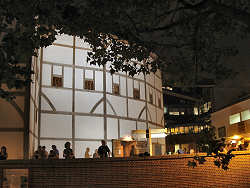 Originally
announced, enigmatically as one of the 'Persephone
Projects', the rarely performed
Troilus and Cressida was presented using the
pronunciation of Shakespeare's time. I looked
forward to this production originally because I haven't
seen the play on stage since I was surprisingly cast as
Hector in my final year at senior school in 1965. Last
season's weekend of Original Pronunciation performances of
Romeo and Juliet proved that the plays can gain
tremendously from being heard in accents closer to those
that Shakespeare heard in his head and on stage.
And recently I have read David Crystal's book called
Pronouncing Shakespeare which is a journal
describing the course of that weekend from inception
through rehearsal to audience and cast reactions. So I was looking forward to
this performance, but was rather disappointed. Originally
announced, enigmatically as one of the 'Persephone
Projects', the rarely performed
Troilus and Cressida was presented using the
pronunciation of Shakespeare's time. I looked
forward to this production originally because I haven't
seen the play on stage since I was surprisingly cast as
Hector in my final year at senior school in 1965. Last
season's weekend of Original Pronunciation performances of
Romeo and Juliet proved that the plays can gain
tremendously from being heard in accents closer to those
that Shakespeare heard in his head and on stage.
And recently I have read David Crystal's book called
Pronouncing Shakespeare which is a journal
describing the course of that weekend from inception
through rehearsal to audience and cast reactions. So I was looking forward to
this performance, but was rather disappointed.
I think that the problems of the production were symptomatic of those of the season as a whole, in that ideas, individually justified, were piled on top of each other making a difficult play much more difficult to understand. To start with this is not one of the Bard's most popular plays, and most of the audience didn't know the story beforehand. This makes a clear production more necessary than when producing Romeo & Juliet say or Othello. It wasn't popular in Shakespeare's day either - it may never have been performed in public. Not the best material to start playing games with. I have no problem with modernish dress, but the anachronisms inevitably introduced often distract this playgoer. At the end of Achilles' sword fight with Hector, Achilles draws a pistol and shoots him! The casting is 'multigender' - the Trojans were cast to their characters' genders and ages, including Philip Bird as an heroic and admirable Hector, and Julia Rylance a lovely Cressida. On the other hand the Greek leaders Agamemnon, Ulysses, Aeneas and Nestor were played by young women, whereas greying actors in their sixties play the Greek heroes Ajax and Achilles. As in her male characters in previous seasons one can never forget that Penelope Beaumont is a women, but she is convincing as Ulysses. Some of the other elderly male impersonations were just comic, and I was never sure if they were meant to be. Then on top of that was added the Shakespearean pronunciation. As predicted in the programme one becomes used to it very quickly, and it can make seemingly unfunny jokes understandable, but only if all the actors speak clearly. I felt that I couldn't have understood some of the actors at times if they had been speaking in modern English! With each new distraction heaped on the last, this was made into hard work. I should like to hear many more Original Pronunciation versions of the plays, but I believe that they should be 'Original Practices' productions, at least in that the costumes are of Shakespeare's time. I do hope that the Globe, under its new director Dominic Dromgoole will be brave enough to let Shakespeare speak for himself. |
||||||||||||||||||||||||||||||||||||||||||||||||||||||
Links |
||||||||||||||||||||||||||||||||||||||||||||||||||||||
|---|---|---|---|---|---|---|---|---|---|---|---|---|---|---|---|---|---|---|---|---|---|---|---|---|---|---|---|---|---|---|---|---|---|---|---|---|---|---|---|---|---|---|---|---|---|---|---|---|---|---|---|---|---|---|
Internal |
||||||||||||||||||||||||||||||||||||||||||||||||||||||
|
||||||||||||||||||||||||||||||||||||||||||||||||||||||
Home|Gaynor|Mike|Art|Theatre|Book Shop |
||||||||||||||||||||||||||||||||||||||||||||||||||||||
Updated 18th September 2005 |
||||||||||||||||||||||||||||||||||||||||||||||||||||||



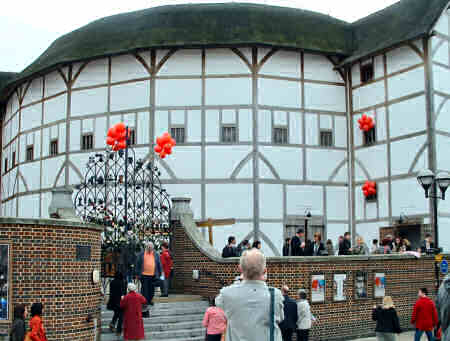
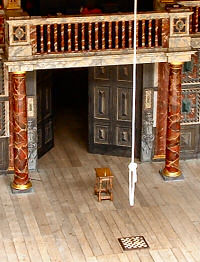
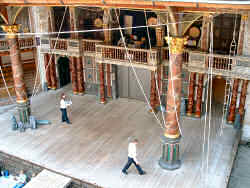 And
interesting it turned out to be. "You came here
for Art? We do Life here, not Art" said Patrice
Naiambana's John Gower soon after the interval.
I knew that this was not going to be an original
practices production, but the jazz music being played
before the play, and the steel lift (elevator) doors
across the central entrance prepared me for the
appearance of the 1940's-style, besuited story-teller
John Gower. Hunter has based the character on the figure
of the griot, who in many West African societies
is musical bard, family counsellor, historian and more.
More unusually, Gower brings on stage with him Old Pericles, played by
Corin Redgrave. For the first half of the play
while Young Pericles, played by Robert Lucksay, makes
the decisions, advisedly or not, that will decide his
and his family's future, the old king weaves in
and out of the action, shouting 'No, don't do it!' to
his younger self, and Gower tells him, that it is
pointless.
And
interesting it turned out to be. "You came here
for Art? We do Life here, not Art" said Patrice
Naiambana's John Gower soon after the interval.
I knew that this was not going to be an original
practices production, but the jazz music being played
before the play, and the steel lift (elevator) doors
across the central entrance prepared me for the
appearance of the 1940's-style, besuited story-teller
John Gower. Hunter has based the character on the figure
of the griot, who in many West African societies
is musical bard, family counsellor, historian and more.
More unusually, Gower brings on stage with him Old Pericles, played by
Corin Redgrave. For the first half of the play
while Young Pericles, played by Robert Lucksay, makes
the decisions, advisedly or not, that will decide his
and his family's future, the old king weaves in
and out of the action, shouting 'No, don't do it!' to
his younger self, and Gower tells him, that it is
pointless.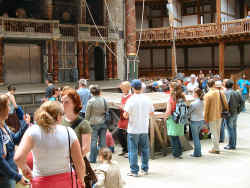 They
'sail' the 'ship' to the middle of the yard on the
platform which extends the stage into the midst of the
groundlings. The scene ends with a beautiful and moving
tableau as the sailors half way down the ropes above the
prostrate king appear to be floating bodies as he is
swept ashore on the platform. This is thrilling theatre,
but not Shakespeare.
They
'sail' the 'ship' to the middle of the yard on the
platform which extends the stage into the midst of the
groundlings. The scene ends with a beautiful and moving
tableau as the sailors half way down the ropes above the
prostrate king appear to be floating bodies as he is
swept ashore on the platform. This is thrilling theatre,
but not Shakespeare.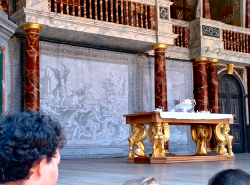 On the afternoon
of 9th June it
was warm and sunny - a perfect Globe day - as long as
you wore a hat to shade your eyes. The canopied stage is
in the shade and the early afternoon mid-summer sun is
high above and behind it, dazzling playgoers. I had
brought my Globe baseball cap which I wouldn't wear
anywhere else because I feel I look silly! The Globe
provides a free cardboard cap with a peak,
and that is what the middle aged ladies next to me wore.
This was their first visit and they loved the
atmosphere, but wished that they had known to hire a
cushion and backrest as I had. Shakespeare's Globe
is an authentic replica of the original, and modern
playgoers find unupholstered wooden benches
uncomfortable, especially after three hours.
On the afternoon
of 9th June it
was warm and sunny - a perfect Globe day - as long as
you wore a hat to shade your eyes. The canopied stage is
in the shade and the early afternoon mid-summer sun is
high above and behind it, dazzling playgoers. I had
brought my Globe baseball cap which I wouldn't wear
anywhere else because I feel I look silly! The Globe
provides a free cardboard cap with a peak,
and that is what the middle aged ladies next to me wore.
This was their first visit and they loved the
atmosphere, but wished that they had known to hire a
cushion and backrest as I had. Shakespeare's Globe
is an authentic replica of the original, and modern
playgoers find unupholstered wooden benches
uncomfortable, especially after three hours.